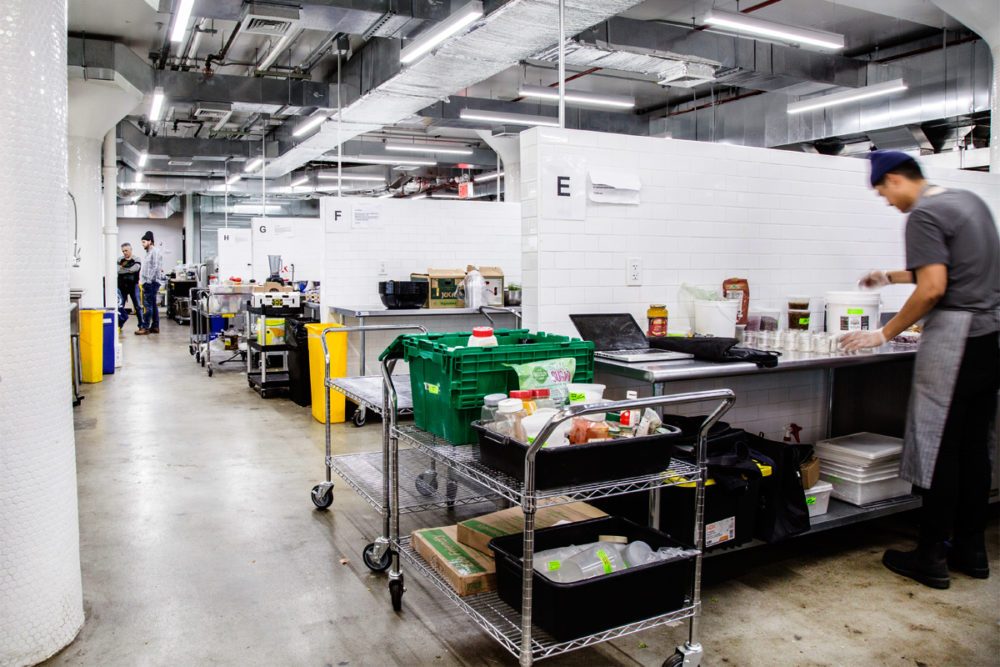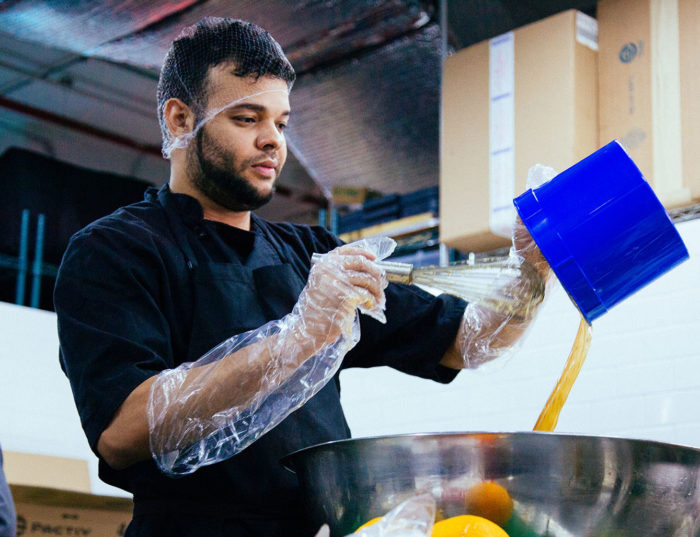Pilotworks Suddenly Closes, Leaving Cooks With No Kitchen
The Brooklyn food-startup incubator, which launched hundreds of businesses, shuts down abruptly with little explanation
Inside the commercial kitchen on Flushing Avenue before the shutdown (Photos courtesy of Pilotworks)
Pilotworks, the Brooklyn-based business incubator that helped launch hundreds of food-company startups, abruptly announced its closing on Saturday, leaving some 175 entrepreneurs suddenly without a home base. The move came “after failing to raise the necessary capital to continue operations,” the company said in a note on its website. “We realize the shock of this news and the disruption it causes for the independent food community …”
Indeed, the shutdown set off a scramble among dozens of food entrepreneurs to find new kitchens and other facilities at the start of their busiest season of the year. Said one of the displaced companies, cookie-maker Keto-Snaps, on its website: “We were shocked yesterday, not 2 hours after a wonderfully successful bake, to learn that Pilotworks Brooklyn, our commercial kitchen space, is suddenly, immediately, and without warning, closing all operations. Keto-Snaps … have been given three days to collect our things from the facility with no wind-down period and no support offered to find alternative space.”
Added Keto-Snaps co-founder Andy Barbera in a comment on The Spoon: “It’s unconscionable to end things so abruptly.” How abruptly? One source told The Bridge that suddenly the gas was cut off while the company was still in the middle of a production batch.

Malai Ice Cream was one of the many Pilotworks startups that went on to success (Photo by Heather Duval)
Reached for comment, a Pilotworks spokesman referred to a statement that the company had announced “that it will cease operations of all its kitchen spaces effective immediately” and that “all staff and members have been notified about the closure and are working with member companies to resolve pressing issues as quickly as possible.”
The incubator and commercial kitchen launched in 2016 as Brooklyn FoodWorks with a $1.3 million grant from the Brooklyn borough president’s office, with a particular focus on helping startups owned by women and minorities. The for-profit venture set up shop in a former Pfizer pharmaceutical plant at 630 Flushing Ave., on the northern edge of Bedford-Stuyvesant.
The incubator underwent a change of management after its original parent company folded and FoodWorks was acquired by entrepreneurs Nick Devane and Mike Dee. The duo changed the company’s name to Pilotworks and its business strategy to one of expanding across the U.S. Scaling up rapidly, the company established outposts in Newark, Dallas, Chicago, Providence and Portland, Ore.

Nick Devane was the company’s co-founder and the CEO until he stepped down in June
With a growth-oriented business plan, the company became a funding magnet, drawing $15.2 million from venture capitalists, according to Crunchbase, including $13 million just last December. Among the investors were celebrities of the food world, notably David Barber, co-owner of Blue Hill and Blue Hill at Stone Barns. “Food’s future depends on strong networks of like-minded eaters and lower barriers of entry for the entrepreneur. Pilotworks accomplishes both under one roof,” said Barber in a press release announcing last December’s funding.
The idea was delicious, drawing rapt attention from the likes of Food & Wine: “Pilotworks’ vision of entrepreneurship is all about taking people’s deep, passionate, personal connections to food, and lowering the barriers to entry that could otherwise prevent them from making that passion into a viable business to be shared. And in doing so, Pilotworks is helping to democratize food entrepreneurship.”
But hints of strains in the execution of that vision surfaced this summer, when co-founder Devane stepped down as CEO to transition to “a new role focusing on long-term creative and strategic initiatives.” Devane was succeeded as CEO by the company’s chief operating officer, Zach Ware, a veteran of the Republic of Tea and Zappos, who had joined Pilotworks four months earlier.

A Pilotworks member on the job at one of the incubator’s 16 workstations
Between its launch and its bitter end, the incubator fostered the launch of more than 300 new products. Among them: Zesty Z, started by the mother-son duo Lorraine and Alexander Harik, who produce a brand of Mediterranean condiment za’atar now available in Whole Foods and other stores around the U.S. Malai Ice Cream, the creation of entrepreneur Pooja Bavishi, has landed its spiced flavors on “best ice cream” lists and recently launched its own shop on Smith Street.
But now the sweet smell of success has turned sour as the incubator’s members search for explanations. “Instead of using the $13 million to make sure they were operating properly in their existing locations, they decided to expand,” David Roa of Superlost, a CBD-focused company, told Grub Street. “It was careless and irresponsible for them to do that considering hundreds of businesses depend on their facilities for their livelihoods.”
Update: In response to the closure, Brooklyn Borough President Eric Adams and City Council Member Robert Cornegy, whose district includes the Pilotworks site, issued a joint statement: “Our community was disappointed to learn of the shuttering of Pilotworks. While we all understand the challenges and variability of the business world, it is concerning to see the impact on so many local food entrepreneurs who were tenants of this incubator. We thank non-profit organizations like Evergreen Exchange who are stepping up amid the confusion and triaging resources to facilitate work and storage spaces for more than 175 affected small businesses. It is our hope that NYCEDC, who has overseen this project since its initial inception, will work to find another shared commercial kitchen operator to operate this incubator for the affected food manufacturers who have relied on this space for their businesses’ well-being.”










